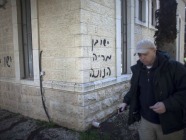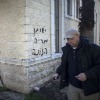 The ADL came out last week with its Top 10 list of "Issues Affecting Jews in 2012,"a list that conspicuously
omits mention of many of the most troubling issues affecting Jews this past year. Below is a list of the most
glaring omissions.
The ADL came out last week with its Top 10 list of "Issues Affecting Jews in 2012,"a list that conspicuously
omits mention of many of the most troubling issues affecting Jews this past year. Below is a list of the most
glaring omissions.
1. Settlements and the occupation. Jews around the world found it increasingly difficult in 2012 to make the
case that the current Israeli government has any interest in peace with the Palestinians, given Israeli policies
whose goal appeared to be to make the occupation irreversible. Indeed, in 2012, faced with a
growing chorus of voices arguing that, given the changes on the ground, the two-state solution is already dead (a
theme settlers
themselves seized on in 2012), Jews who defended Israel's commitment to the two-state solution increasingly sounded
like members of the flat-earth society.
A man passes by anti-Christian graffiti written in Hebrew on the walls of the Baptist House church in central
Jerusalem on February 20, 2012. (Menahem Kahana / AFP / Getty Images)
2. Price-tag. The growing lawlessness and violence
of some Israeli Jews was chilling in 2012. Jews, especially Israeli settlers, regularly attacked innocent
Palestinians and their property, and even IDF soldiers. Israeli authorities seemed powerless--or unwilling--to stop
them, even as these attacks crossed the Green Line and targeted churches and mosques inside Israel (the ADL was
troubled enough to condemn such attacks last week).
In Jerusalem, 2012 saw lynch attempts by
Israelis against Palestinians.
3. The erosion of respect for the rights of women in Israel. 2012 was a year in which
ads with photos of women were defaced and ripped off walls in Jerusalem. A year in which Israeli women were
told to move to the back
of the bus. A year in which Israeli soldiers walked out of events where women
were singing. The year when women had to fight
"modesty" signs posted in supermarkets by ultra-Orthodox Jews.
4. Rising racism against refugees and migrants. 2012 was a year marked by increased anti-African-refugee
actions in Israel. Rallies featured prominent Israeli politicians spouting openly racist slogans. Legislation was enacted
that made Israel arguably the least hospitable destination for refugees on earth. 2012 was the year when the
Israeli government left African refugees/migrants/human beings
trapped on the border without food or water, and barred Israel relief workers from reaching them. It was the
year of increasing xenophobic
violence, including pogroms against African refugees in Tel Aviv and arson attacks against them in
Jerusalem.
5. Threats to democracy and civil society in Israel. In November 2011, the ADL's own Abe Foxman was
sufficiently concerned about anti-democratic trends in Israel that he authored an op-ed entitled, "The Assault on Israel's Vibrant
Democracy." His worry was well-founded. 2012 saw a seemingly endless stream of anti-democratic
legislation in the Knesset, targeting Israeli organizations dealing with civil rights, minority rights, human
rights, and peace. This trend is set to get worse in 2013, with the likely election of even more Knesset members
who believe democracy means tyranny of the majority and support "rule by law," as opposed to "rule of law."
6. BDS. During 2012, Netanyahu and his fellow travelers appeared determined to do everything possible to
strengthen the global movement pushing for boycotts and divestment against Israel--by undertaking acts that were
increasingly provocative, by making clear that they felt that nobody would hold
them accountable, and by continuing to insist
that activism specifically targeting settlements was as anti-Israel and illegitimate as activism targeting Israel
itself.
7. Anti-Semitism. In 2012, the "Israel-right-or-wrong" crowd continued to cheapen the very serious issue of
anti-Semitism. Some sought to stifle criticism of Israeli policies with the specious argument that anti-Israel activism is
synonymous with anti-Semitism. This odious argument was compounded by the continued insistence that Israeli
policies and actions--like those that birthed the awful images of Israeli behavior that were recently plastered all
over
YouTube and Twitter--don't fuel both anti-Israel sentiment and anti-Semitism.
8. Efforts to quash Jewish voices inside the U.S. 2012 was the year when inside the U.S., there were
extremely worrying efforts to
stifle progressive Jewish voices (some of which started
in late 2011 and continued into the new year) and to undermine U.S. support for civil society groups in Israel.
9. The Gaza blockade. Israel has a right to defend its borders and its citizens. In 2012, however, it became
ever-more difficult explain, let alone defend, Israel's continued blockade of Gaza (now in its sixth year)--a
blockade that prevents virtually all exports, prevents movement of people, makes the lives of innocent civilians
miserable and that self-evidently has not achieved its ostensible
goals (i.e. keeping weapons out of Gaza and weakening Hamas).
10. The rise of right-wing Israel. During 2012, Jews remained mostly liberal and progressive in their values
(reflected in the fact that they voted overwhelmingly for Obama). For many of these Jews, the continuing shift
toward extremism and intolerance in Israel in 2012 was deeply troubling, as many of the current leaders of Israel
manifestly do not share our proud,
democratic values. Moreover, Netanyahu and his foreign minister appeared determined to poke fingers in the eyes
even of their closest allies, and to treat any criticism as beyond the pale--most recently, by attacking the Obama
Administration after it stood with Israel at the U.N., and by accusing European countries of Nazi policies for objecting to settlement
expansion. Many of the most powerful leaders in Israel in 2012 (and heading into 2013) sound more like militant Tea
Party members than proud Zionists preserving the dream of a secure, Jewish, democratic Israel living in peace with
its neighbors.
Were these the most important things affecting Jews in 2012? Clearly, such a judgment is subjective. But surely
these concerns are more important--for the health and future of the Jewish people--than the Olympic Committee's
failure to commemorate the Munich Massacre (#8 on the ADL's list).
This article originally appeared at Open Zion on December
17, 2012 